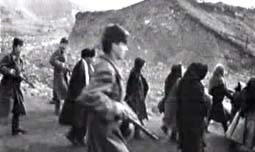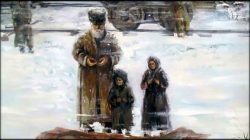
Cherkessk/Agency Caucasus – The people of Karachay-Cherkessia paid homage on November 2 to their parents as well as to their grandparents whom Joseph Stalin, a dictator of the Soviet Union, forced 65 years ago in 1943 to live in exile in Central Asian regions.
In addition to the large numbers of people, state officials also joined commemorations that took place both in Cherkessk, the capital city, and Karachayevsk on the 65th anniversary of the exile. Prayers were said in churches and mosques for tens of thousands who had died in exile.
The whole population of Karachay-Cherkessia was forced into exile 65 years ago. Stalinism, a regime established and named after Stalin himself, had it as its goal to wipe the local people out of the beautiful mountains, a fact that later contributed to the annexation of the Karachay regions to Georgia in the aftermath of the exile.
Ismail Aliyev, Assistant Prime Minister of Karachay-Cherkessia, told commemorators that younger generations had to learn a set of lessons from the past. Aliyev put the lessons to be learnt as follows: "The first lesson is a humanitarian one. Despite severe cold, hunger and death, our parents never felt hostile to the rest of the world. They managed to remain good and lively. The second lesson for the younger generations to learn is that our parents and their parents stayed faithful to their ethnic, religious and cultural values even when they had to suffer many hardships abroad. The third lesson is that the Karachays continued to be industrious even when they were living in exile–a point which eventually earned them several medals, tokens and other different types of awards. And the fourth lesson is that when the Karachays managed to return to the Caucasus, they did not only rebuild the former conditions of life that they had had before the exile but they also reached a high level of prosperity.
The fifth lesson came from Boris Ebzeyev, President of Karachay-Cherkessia: "The tragic life that our parents and grandparents led suggests that the younger generations should stay alert al the time. There are things that we ought to be afraid of–things like what happened in South Ossetia."
More than 100 000 women, children and old people were sent on November 2, 1943, from Karachay-Cherkessia to live in exile in Uzbekistan, Kyrgyzstan and Kazakhstan. As many as 60 000 Karachays, one third of which was comprised of children, died while they were being brought to their destinations. Similarly, Balkars in Kabardino-Balkaria, Chechens and Ingushes are amongst the Caucasian peoples who were sent into exile.
ÖZ/FT








